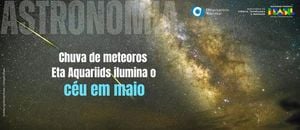Muslims around the world are eagerly awaiting the announcement of the start of Ramadan 2025, the holiest month of the Islamic calendar. This year, the significant time of fasting is set to commence with the sighting of the crescent moon, and many are observing the sky tonight, February 28, to see if they can catch the first glimpse.
Ramadan commemorates the month when the Qur’an was revealed to the Prophet Muhammad, making it one of the most revered periods for Muslims. During this month, practitioners engage in fasting from dawn until sunset, abstaining from food, drink, and intimate relations during daylight hours. Observers will stay on the lookout for the crescent moon, which indicates the beginning of this sacred month.
Astronomers across the globe are participating in this age-old tradition of moon sighting. The Royal Greenwich Observatory in South London is hosting a live show to witness the crescent moon around 5:45 PM. With the fast lasting 29 to 30 days, Ramadan affects the daily routines of millions, as they adjust their schedules to accommodate early morning meals (Suhoor) and the fasting lifestyle throughout the days.
The potential for varying start dates is compounded by the countries' methods for confirming moon sightings. Saudi Arabia typically declares Ramadan beginning on March 1, 2025, whilst Morocco, which relies solely on naked-eye sightings, may push its starting date to March 2. Such discrepancies arise when visibility conditions differ across regions. The need for optical assistance to see the moon is expected for early sightings, such as those occurring tonight.
For example, predictions for crescent sightings are as follows:
- Mecca, Saudi Arabia: It's indicated to be visible with optical aid today. Sunset is at 6:25 PM, with moonset at 6:58 PM. By March 1, it will be easily visible clearer.
- Rabat, Morocco: Also requiring optical aid tonight, with sunset at 6:23 PM and moonset at 7:08 PM. It is expected to be visible on March 1.
- London, UK: The moon will need optical assistance tonight, with sunset at 5:40 PM and moonset at 6:29 PM. Visibility improves tomorrow, allowing easier sightings.
According to the HM Nautical Almanac Office, "Telescopic sightings of the crescent moon with small, conventional amateur-sized telescopes are possible on Friday, February 28th, from as far east as westernmost parts of the Saudi Peninsula, eastern and central parts of Africa and western parts of Europe including the United Kingdom and Ireland." They elaborated on sightings and visibility, noting how "easy sightings the same day should be possible from the northernmost parts of South America, Central America, the United States, western Canada, and the Pacific Ocean region to the east of the International Date Line."
This variability raises questions about how the start of Ramadan could differ globally, showcasing the traditional significance of moon sightings and the importance of astronomy within Islam. It’s fascinating to note the cultural importance these ancient practices hold for millions around the world, continuing to unite families and communities through shared faith and traditions.
Fasting during Ramadan can also take its toll, particularly as Muslims adapt to new patterns affecting their productivity levels at work or school. The initial days can be particularly challenging as the body seeks to adjust. It’s worth noting, though, many individuals, such as pregnant women or those ill, may be exempt from fasting during this period.
Ramadan ends upon the sighting of the crescent moon for the following month, marking the completion of this respected period of reflection and discipline. The month is encapsulated by five pillars of Islam — Zakat (charity), Salat (prayer), Hajj (pilgrimage), Sawm (fasting during Ramadan), and Shahadah (declaration of faith).
Each Ramadan, millions embrace the opportunity to deepen their spirituality, reconnect with family, and engage differently with their communities. The anticipation for the start of Ramadan, rooted deeply within tradition, reflects both collective hope and devotion.



